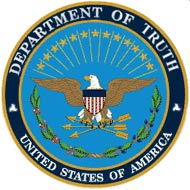James P. Pinkerton
There’s nothing like a war to bring out the inner George Orwell in a government. In ways little and small, Uncle Sam has been morphing into Big Brother - spinning the news, even, apparently, manufacturing news.

Yesterday, the Gannett News Service reported that 11 different U.S. newspapers had unwittingly printed identical five-paragraph letters-to-the- editor from soldiers in Iraq. The letters were full of upbeat puff - “the quality of life and security for the citizens has been largely restored” - the kind that some PR blitzer might dream up.
None of the soldiers contacted by Gannett for comment said that they had written the letter; it had been handed to them for signature, they said, by Army superiors. Indeed, one soldier said he hadn’t even seen the letter before it appeared in his hometown paper.
Somewhere, Orwell’s ghost is smiling grimly. In his novel “1984,” the British writer imagined a Ministry of Truth that would be responsible for manufacturing news of victories and triumphs. Now, it’s no longer fiction; it’s your tax dollars at work.
Another Orwellian concept was “doublethink,” defined as the ability “to forget any fact that has become inconvenient, and then, when it becomes necessary again, to draw it back from oblivion for just so long as it is needed.” This administration is doublethinking, doubletime, in its effort to justify the Iraq war - and so the inconvenient truth is shipped off to convenient oblivion.

Last Thursday, for example, President George W. Bush declared, “America must not forget the lessons of September 11th . . . We must fight this war until the work is done.” Bush seems to be saying that we invaded Iraq because Iraq was involved in 9/11.
But, of course, that’s not true, as Bush himself admitted in an off-message moment. The truth is that 9/11 gave the neoconservatives who influence Bush the excuse they needed for “regime change,” which they had advocated long before 9/11. Now, after the fact, Bush is asking Americans to make the doublethink leap of faith: The United States was attacked by al-Qaeda, so we had to attack Saddam Hussein. Got that?
On Friday, as part of the same “truth” offensive, Vice President Dick Cheney recalled the efforts during the 1990s to stymie Iraqi weapons of mass destruction, such as United Nations inspections and targeted air strikes. “All of these measures failed,” Cheney said.
No, actually, all those measures succeeded, which is why we haven’t found anything resembling a weapon of mass destruction in Iraq.

Others, too, are part of this Orwellian tactic, although they sometimes bobble their assignment. Rep. Kay Granger (Texas) had just returned home from a government-sponsored tour of Iraq when she appeared on Fox News to comment on Sunday’s car bombing in Baghdad. Proving she’s a good listener, she insisted that the suicide attack was actually good news. How’s that? Speaking of the American nation-building effort, she explained, “As it’s working, there are more incidents like this, from people who don’t want it to work.”
By that inverted logic, of course, it would be bad news if there were fewer bombings. But then, undercutting Granger’s case, the interviewer noted that Granger and her fellow visitors had not actually stayed overnight in Iraq while they were visiting the country; each night, they were flown back to Kuwait, some 400 miles south of Baghdad. One might think for a moment about the implications of such a long-distance commute. If all the American security in Iraq can’t make Iraq secure for VIPs, then maybe Iraq isn’t so secure.
Bush insists that America is following a “clear strategy” in Iraq, but it’s about as clear as a kaleidoscope, as explanations and rationalizations rotate in an endless jumble.
And yet despite the best efforts of America’s would-be Ministry of Truthsters to bedazzle and bamboozle the American people, the plain light of reality seems to be shining through. According to a Gallup Poll released yesterday, a majority of Americans, for the first time, disapprove of the way Bush is handling Iraq.
Of course, the administration won’t give up without a struggle - including its struggle against reality, which has an awkward way of bleeding into their happy talk. In the meantime, someone needs to write a sequel to 1984. It would be called 2003.